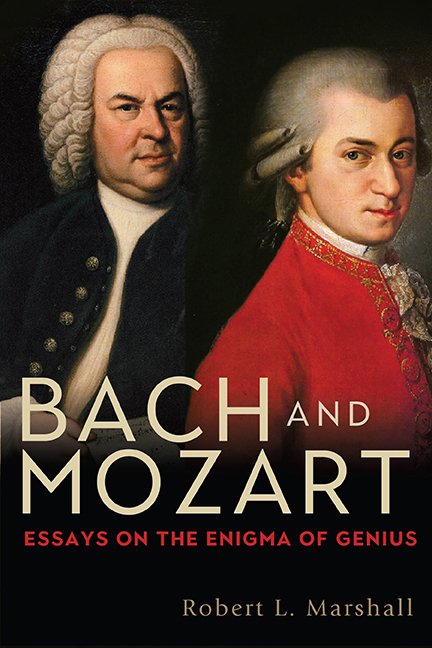Book contents
- Frontmatter
- Dedication
- Epigraph
- Contents
- List of Figures
- Preface
- List of Abbreviations
- Prologue. The Century of Bach and Mozart as a Music-Historical Epoch: A Different Argument for the Proposition
- 1 Young Man Bach: Toward a Twenty-First-Century Bach Biography
- 2 The Notebooks for Wilhelm Friedemann and Anna Magdalena Bach: Some Biographical Lessons
- 3 Bach and Luther
- 4 Redeeming the St. John Passion–and J. S. Bach
- 5 Bach's Keyboard Music
- 6 The Minimalist and Traditionalist Approaches to Performing Bach's Choral Music: Some Further Thoughts
- 7 Truth and Beauty: J. S. Bach at the Crossroads of Cultural History
- 8 Bach at Mid-Life: The Christmas Oratorio and the Search for New Paths
- 9 Bach at the Boundaries of Music History: Preliminary Reflections on the B-Minor Mass and the Late-Style Paradigm
- 10 Father and Sons: Confronting a Uniquely Daunting Paternal Legacy
- 11 Johann Christian Bach and Eros
- 12 Bach and Mozart: Styles of Musical Genius
- 13 Mozart and Amadeus
- 14 Bach and Mozart's Artistic Maturity
- 15 Mozart's Unfinished: Some Lessons of the Fragments
- Epilogue (ossia Postmortem). Had Mozart Lived Longer: Some Cautious (and Incautious) Speculations
- Notes
- Works Cited
- Index
- Miscellaneous Endmatter
- Eastman Studies in Music
1 - Young Man Bach: Toward a Twenty-First-Century Bach Biography
Published online by Cambridge University Press: 29 March 2020
- Frontmatter
- Dedication
- Epigraph
- Contents
- List of Figures
- Preface
- List of Abbreviations
- Prologue. The Century of Bach and Mozart as a Music-Historical Epoch: A Different Argument for the Proposition
- 1 Young Man Bach: Toward a Twenty-First-Century Bach Biography
- 2 The Notebooks for Wilhelm Friedemann and Anna Magdalena Bach: Some Biographical Lessons
- 3 Bach and Luther
- 4 Redeeming the St. John Passion–and J. S. Bach
- 5 Bach's Keyboard Music
- 6 The Minimalist and Traditionalist Approaches to Performing Bach's Choral Music: Some Further Thoughts
- 7 Truth and Beauty: J. S. Bach at the Crossroads of Cultural History
- 8 Bach at Mid-Life: The Christmas Oratorio and the Search for New Paths
- 9 Bach at the Boundaries of Music History: Preliminary Reflections on the B-Minor Mass and the Late-Style Paradigm
- 10 Father and Sons: Confronting a Uniquely Daunting Paternal Legacy
- 11 Johann Christian Bach and Eros
- 12 Bach and Mozart: Styles of Musical Genius
- 13 Mozart and Amadeus
- 14 Bach and Mozart's Artistic Maturity
- 15 Mozart's Unfinished: Some Lessons of the Fragments
- Epilogue (ossia Postmortem). Had Mozart Lived Longer: Some Cautious (and Incautious) Speculations
- Notes
- Works Cited
- Index
- Miscellaneous Endmatter
- Eastman Studies in Music
Summary
For admirers of Johann Sebastian Bach, the year 2000 did not just mark the 250th anniversary of the composer's death. It was also the fiftieth anniversary of the modern era of Bach research—a period that produced some of the most impressive achieve-ments ever recorded in the annals of musical scholarship. This “golden age” of Bach scholarship—if we, the participants in it, may so smugly refer to it thus—began in 1950, the two-hundredth anniversary of Bach's death, with the publication of Wolfgang Schmieder's Bach-Werke-Verzeichnis (BWV) and the decision to prepare a new complete critical edition of Bach's works, the Neue Bach-Ausgabe (NBA). Work on the NBA led in turn to the development of new empirical methods—methods such as paper, ink, and handwriting analysis (previously more typical of disciplines like criminology than musicology)—in order to organize the materials and lift from the realm of largely subjective impression the indispensable tasks of establishing authenticity and dating sources. They have since become indispensable for all “basic” musicological research.
An unexpected and, as it turned out, epochal consequence of this sorting activity was logged before the end of the 1950s when Alfred Dürr and Georg von Dadelsen (the Crick and Watson of Bach research), working in friendly rivalry, succeeded in constructing a chronology of virtually the entire corpus of Bach's vocal music precise enough to date the majority of Bach's vocal compositions to within a week. In dem-onstrating that the vast majority of Bach's surviving Leipzig church music, consisting of some 150 compositions, had been written between 1723 and 1727, Dürr and Dadelsen had completely overturned the conventional view of how a major stretch of Bach's career had unfolded. It seemed almost as if Bach had been in a hurry to get the job of composing cantatas over with. And if he had not been spending a substantial portion of his twenty-seven years as Thomaskantor composing church music, then what had he been doing? The prevailing understanding of Bach's life and outlook and artistic development clearly had to be reconsidered.
It was not long before the gauntlet was thrown down by Friedrich Blume, argu-ably the preeminent German musicologist of the postwar period.
- Type
- Chapter
- Information
- Bach and MozartEssays on the Engima of Genius, pp. 9 - 29Publisher: Boydell & BrewerPrint publication year: 2019



